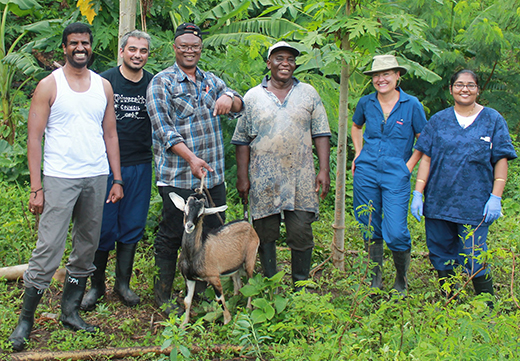Kansas State University collaboration looks at tick-borne disease research in the Caribbean
Wednesday, Aug. 16, 2017

A collaborative tick-borne disease research team from Kansas State University and St. George's University in Grenada doing field work on the Caribbean island. From left: Roman Ganta, director of the Center for Excellence for Vector-Borne Diseases at K-State; Alok Desai, a veterinary student at St. George's; Andy Alhassan, a K-State postdoctoral researcher in diagnostic medicine and pathobiology; a Grenadian farmer; Melinda Wilkerson, professor and chair of pathobiology at St. George's; and Bhumika Sharma, a researcher at St. George's. | Download this photo.
MANHATTAN — Tropical islands might be a paradise for tourists, but they are also a breeding ground for a wide variety of pathogens transmitted by ticks and other disease vectors. New research by Kansas State University is looking at tick-borne diseases and their effect on the people and the agricultural and companion animals in the Caribbean.
The research, sgu.edu/academic-programs/school-of-veterinary-medicine/, is a collaboration between Kansas State University and St. George's University on the island of Grenada.
From the College of Veterinary Medicine, the researchers are Roman Ganta, director of the College of Veterinary Medicine's Center for Excellence for Vector-Borne Diseases, and Andy Alhassan, a postdoctoral researcher in diagnostic medicine and pathobiology. Alhassan's work is supported by a postdoctoral fellowship grant from St. George's.
The Center for Excellence for Vector-Borne Diseases is an interdisciplinary research center with a mission to combat vector-borne diseases with a focus on pathogenesis, surveillance and disease prevention.
"We initiated and executed this research project focused on defining tick-borne disease prevalence in ruminants, such as sheep, goats and cattle, as well as in dogs from the island," Ganta said.
Ganta said the proposed goals of the 2017 project are to evaluate the current existing resources at St. George's, develop a realistic and executable plan, and then initiate research at field sites and in research laboratories at the Grenadian university.
"To achieve these goals requires considerable discussions among the principle investigators and the project personnel, on-site assessments of the existing resources, developing plans and overseeing the initiation of experimental studies and mentoring," Ganta said.
Project investigators include Melinda Wilkerson, a former College of Veterinary Medicine faculty member who is now on the faculty of St. George's University. Wilkerson also is an adjunct faculty member at Kansas State University. Participating researchers from St. George's also include Bhumika Sharma and Kathryn Gibson.
"Another research team member from St. George's is Alok Desai, a Doctor of Veterinary Medicine student, who has already presented a poster at a summer research scholar program meeting regarding the work we initiated," Ganta said. "We anticipate several positive outcomes from this exciting project, including scientific publications and presentations in the near future."
More information about the Center for Excellence for Vector-Borne Diseases and its projects is available at vet.k-state.edu/research/cevbd/index.html.
